Comprehensive Analysis of UK Housing Market Trends: 2009-2019, BABS
VerifiedAdded on 2023/01/10
|12
|3770
|84
Report
AI Summary
This report provides a comprehensive analysis of the UK housing market from 2009 to 2019. It examines the changes in average house prices, highlighting significant increases and regional variations across the UK. The report delves into the economic determinants influencing these changes, including interest rates, economic growth, customer confidence, mortgage availability, and supply dynamics. Furthermore, it assesses the effects of government actions and policies on the housing market, evaluating their impact on market trends. The report also explores the impact of the Coronavirus (COVID-19) pandemic on the UK housing industry, analyzing its effects on market operations and providing insights into strategies for organizations to gain a competitive edge. Through this analysis, the report offers a detailed understanding of the complex interplay of factors shaping the UK housing market over the past decade.
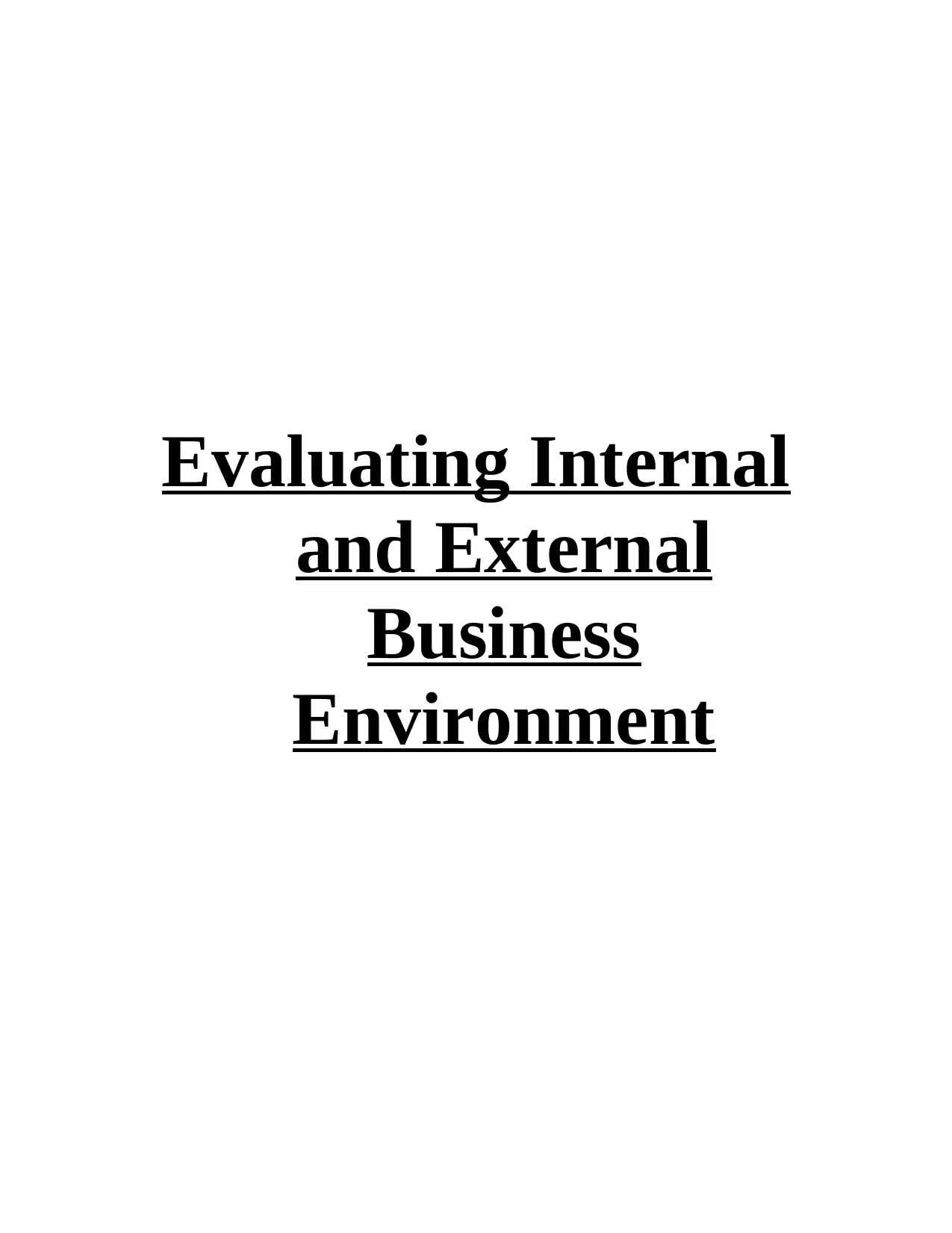
Evaluating Internal
and External
Business
Environment
and External
Business
Environment
Paraphrase This Document
Need a fresh take? Get an instant paraphrase of this document with our AI Paraphraser
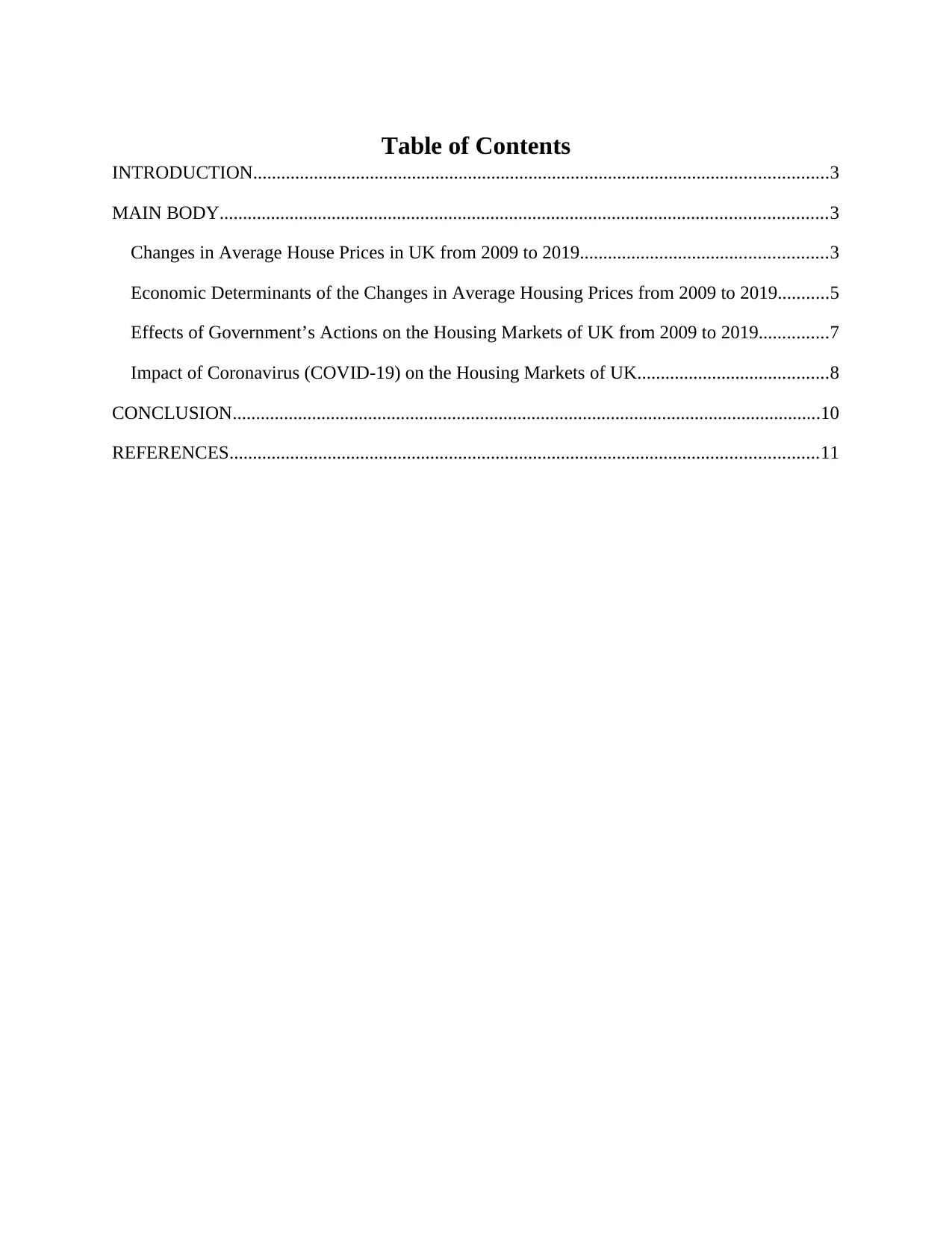
Table of Contents
INTRODUCTION...........................................................................................................................3
MAIN BODY..................................................................................................................................3
Changes in Average House Prices in UK from 2009 to 2019.....................................................3
Economic Determinants of the Changes in Average Housing Prices from 2009 to 2019...........5
Effects of Government’s Actions on the Housing Markets of UK from 2009 to 2019...............7
Impact of Coronavirus (COVID-19) on the Housing Markets of UK.........................................8
CONCLUSION..............................................................................................................................10
REFERENCES..............................................................................................................................11
INTRODUCTION...........................................................................................................................3
MAIN BODY..................................................................................................................................3
Changes in Average House Prices in UK from 2009 to 2019.....................................................3
Economic Determinants of the Changes in Average Housing Prices from 2009 to 2019...........5
Effects of Government’s Actions on the Housing Markets of UK from 2009 to 2019...............7
Impact of Coronavirus (COVID-19) on the Housing Markets of UK.........................................8
CONCLUSION..............................................................................................................................10
REFERENCES..............................................................................................................................11
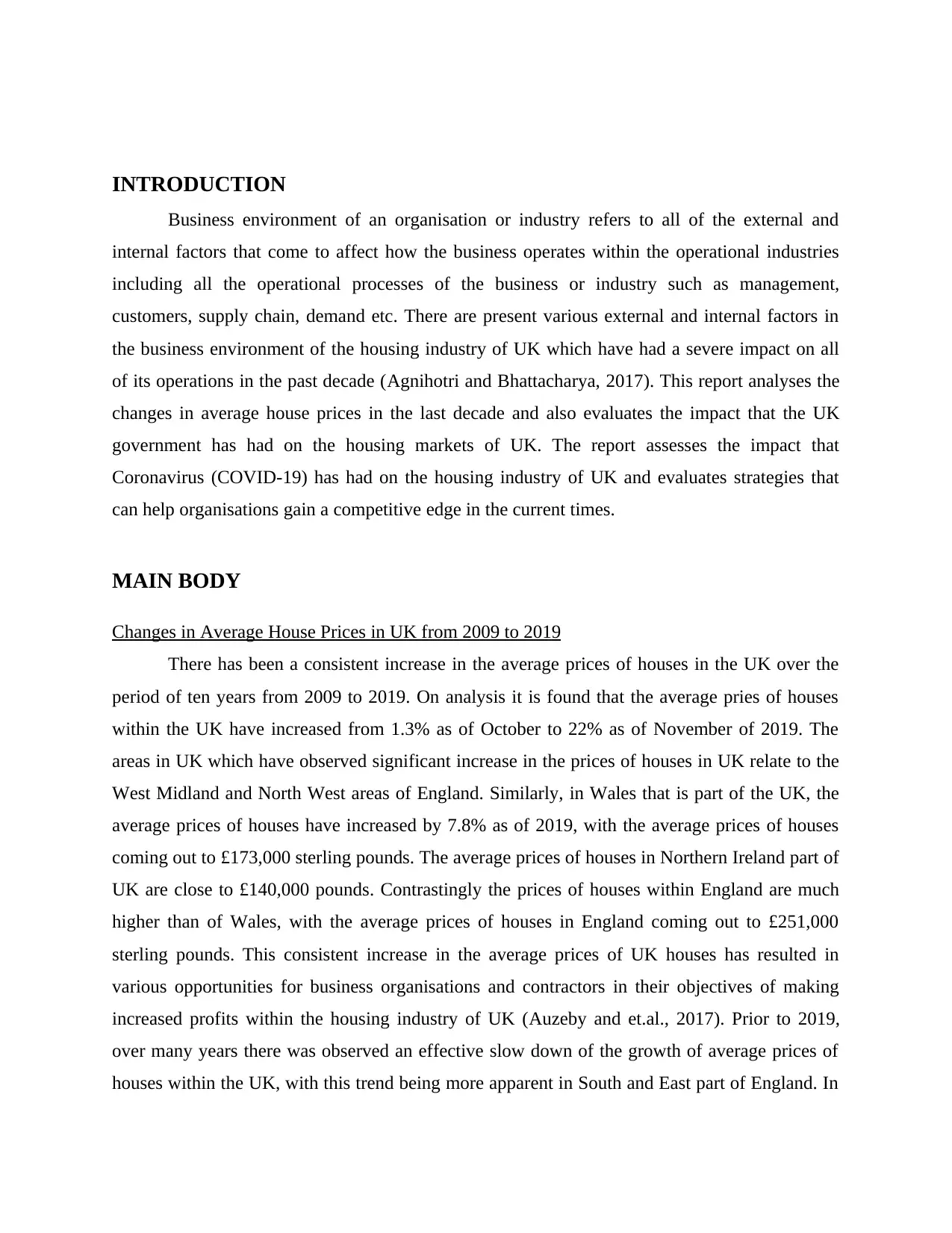
INTRODUCTION
Business environment of an organisation or industry refers to all of the external and
internal factors that come to affect how the business operates within the operational industries
including all the operational processes of the business or industry such as management,
customers, supply chain, demand etc. There are present various external and internal factors in
the business environment of the housing industry of UK which have had a severe impact on all
of its operations in the past decade (Agnihotri and Bhattacharya, 2017). This report analyses the
changes in average house prices in the last decade and also evaluates the impact that the UK
government has had on the housing markets of UK. The report assesses the impact that
Coronavirus (COVID-19) has had on the housing industry of UK and evaluates strategies that
can help organisations gain a competitive edge in the current times.
MAIN BODY
Changes in Average House Prices in UK from 2009 to 2019
There has been a consistent increase in the average prices of houses in the UK over the
period of ten years from 2009 to 2019. On analysis it is found that the average pries of houses
within the UK have increased from 1.3% as of October to 22% as of November of 2019. The
areas in UK which have observed significant increase in the prices of houses in UK relate to the
West Midland and North West areas of England. Similarly, in Wales that is part of the UK, the
average prices of houses have increased by 7.8% as of 2019, with the average prices of houses
coming out to £173,000 sterling pounds. The average prices of houses in Northern Ireland part of
UK are close to £140,000 pounds. Contrastingly the prices of houses within England are much
higher than of Wales, with the average prices of houses in England coming out to £251,000
sterling pounds. This consistent increase in the average prices of UK houses has resulted in
various opportunities for business organisations and contractors in their objectives of making
increased profits within the housing industry of UK (Auzeby and et.al., 2017). Prior to 2019,
over many years there was observed an effective slow down of the growth of average prices of
houses within the UK, with this trend being more apparent in South and East part of England. In
Business environment of an organisation or industry refers to all of the external and
internal factors that come to affect how the business operates within the operational industries
including all the operational processes of the business or industry such as management,
customers, supply chain, demand etc. There are present various external and internal factors in
the business environment of the housing industry of UK which have had a severe impact on all
of its operations in the past decade (Agnihotri and Bhattacharya, 2017). This report analyses the
changes in average house prices in the last decade and also evaluates the impact that the UK
government has had on the housing markets of UK. The report assesses the impact that
Coronavirus (COVID-19) has had on the housing industry of UK and evaluates strategies that
can help organisations gain a competitive edge in the current times.
MAIN BODY
Changes in Average House Prices in UK from 2009 to 2019
There has been a consistent increase in the average prices of houses in the UK over the
period of ten years from 2009 to 2019. On analysis it is found that the average pries of houses
within the UK have increased from 1.3% as of October to 22% as of November of 2019. The
areas in UK which have observed significant increase in the prices of houses in UK relate to the
West Midland and North West areas of England. Similarly, in Wales that is part of the UK, the
average prices of houses have increased by 7.8% as of 2019, with the average prices of houses
coming out to £173,000 sterling pounds. The average prices of houses in Northern Ireland part of
UK are close to £140,000 pounds. Contrastingly the prices of houses within England are much
higher than of Wales, with the average prices of houses in England coming out to £251,000
sterling pounds. This consistent increase in the average prices of UK houses has resulted in
various opportunities for business organisations and contractors in their objectives of making
increased profits within the housing industry of UK (Auzeby and et.al., 2017). Prior to 2019,
over many years there was observed an effective slow down of the growth of average prices of
houses within the UK, with this trend being more apparent in South and East part of England. In
⊘ This is a preview!⊘
Do you want full access?
Subscribe today to unlock all pages.

Trusted by 1+ million students worldwide
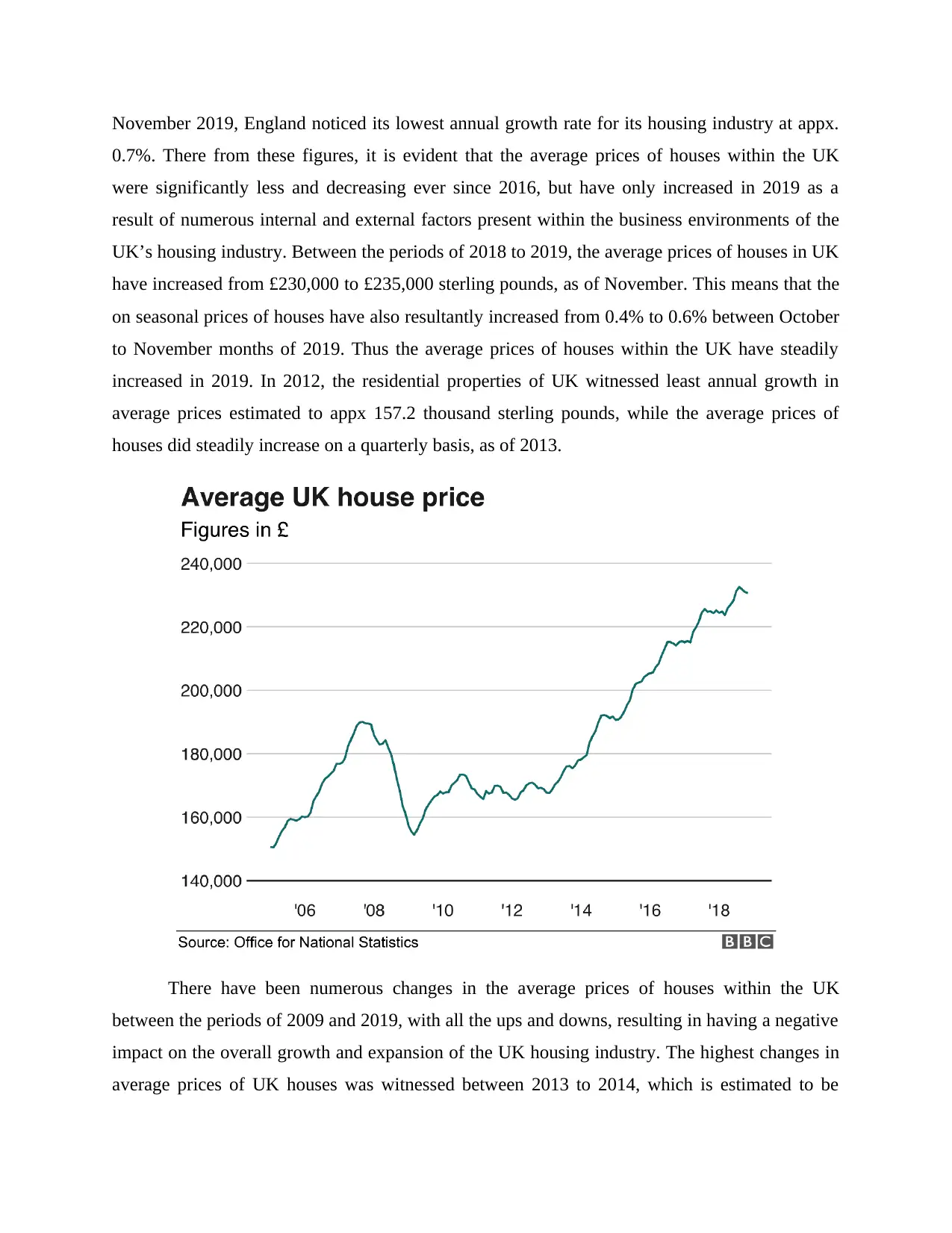
November 2019, England noticed its lowest annual growth rate for its housing industry at appx.
0.7%. There from these figures, it is evident that the average prices of houses within the UK
were significantly less and decreasing ever since 2016, but have only increased in 2019 as a
result of numerous internal and external factors present within the business environments of the
UK’s housing industry. Between the periods of 2018 to 2019, the average prices of houses in UK
have increased from £230,000 to £235,000 sterling pounds, as of November. This means that the
on seasonal prices of houses have also resultantly increased from 0.4% to 0.6% between October
to November months of 2019. Thus the average prices of houses within the UK have steadily
increased in 2019. In 2012, the residential properties of UK witnessed least annual growth in
average prices estimated to appx 157.2 thousand sterling pounds, while the average prices of
houses did steadily increase on a quarterly basis, as of 2013.
There have been numerous changes in the average prices of houses within the UK
between the periods of 2009 and 2019, with all the ups and downs, resulting in having a negative
impact on the overall growth and expansion of the UK housing industry. The highest changes in
average prices of UK houses was witnessed between 2013 to 2014, which is estimated to be
0.7%. There from these figures, it is evident that the average prices of houses within the UK
were significantly less and decreasing ever since 2016, but have only increased in 2019 as a
result of numerous internal and external factors present within the business environments of the
UK’s housing industry. Between the periods of 2018 to 2019, the average prices of houses in UK
have increased from £230,000 to £235,000 sterling pounds, as of November. This means that the
on seasonal prices of houses have also resultantly increased from 0.4% to 0.6% between October
to November months of 2019. Thus the average prices of houses within the UK have steadily
increased in 2019. In 2012, the residential properties of UK witnessed least annual growth in
average prices estimated to appx 157.2 thousand sterling pounds, while the average prices of
houses did steadily increase on a quarterly basis, as of 2013.
There have been numerous changes in the average prices of houses within the UK
between the periods of 2009 and 2019, with all the ups and downs, resulting in having a negative
impact on the overall growth and expansion of the UK housing industry. The highest changes in
average prices of UK houses was witnessed between 2013 to 2014, which is estimated to be
Paraphrase This Document
Need a fresh take? Get an instant paraphrase of this document with our AI Paraphraser
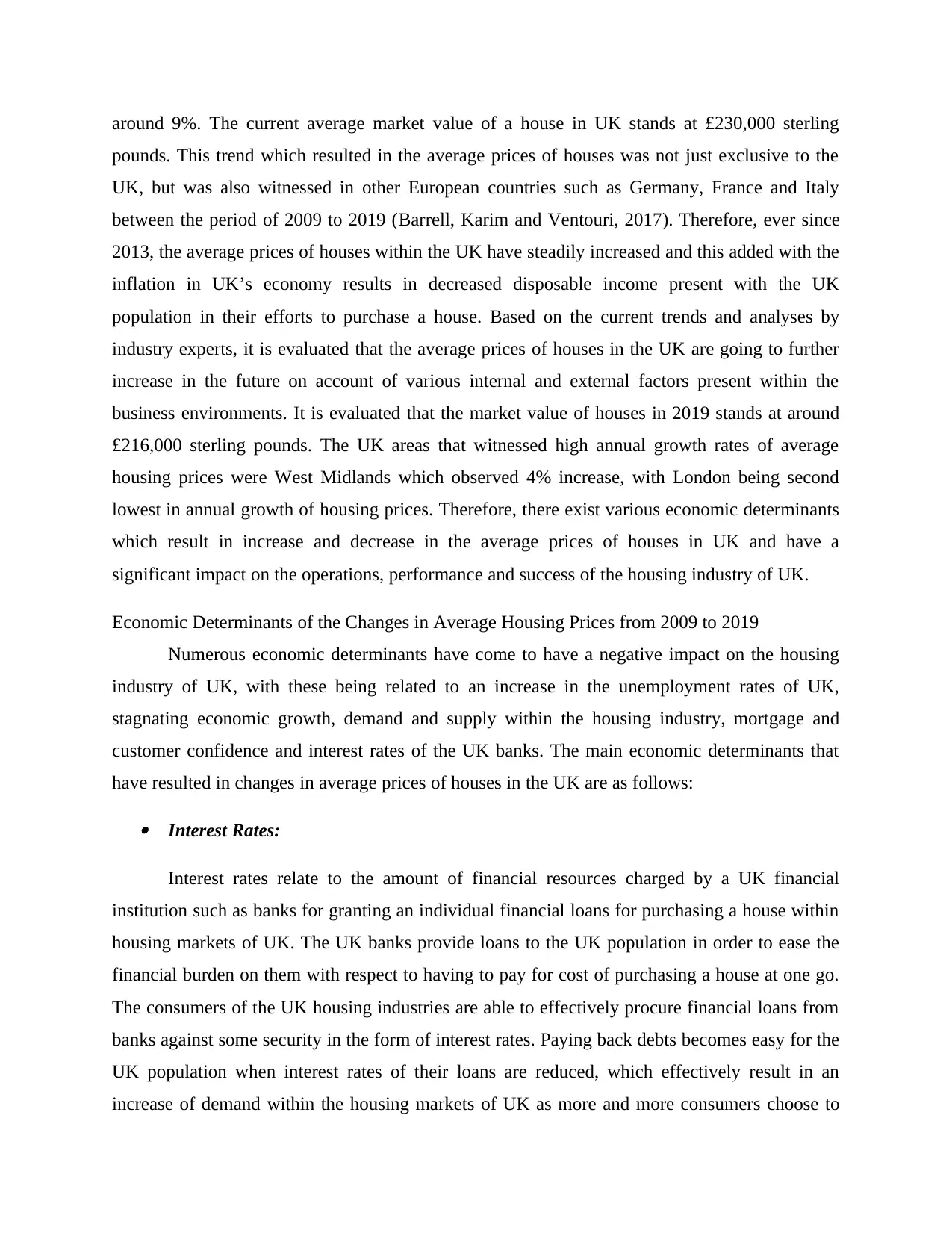
around 9%. The current average market value of a house in UK stands at £230,000 sterling
pounds. This trend which resulted in the average prices of houses was not just exclusive to the
UK, but was also witnessed in other European countries such as Germany, France and Italy
between the period of 2009 to 2019 (Barrell, Karim and Ventouri, 2017). Therefore, ever since
2013, the average prices of houses within the UK have steadily increased and this added with the
inflation in UK’s economy results in decreased disposable income present with the UK
population in their efforts to purchase a house. Based on the current trends and analyses by
industry experts, it is evaluated that the average prices of houses in the UK are going to further
increase in the future on account of various internal and external factors present within the
business environments. It is evaluated that the market value of houses in 2019 stands at around
£216,000 sterling pounds. The UK areas that witnessed high annual growth rates of average
housing prices were West Midlands which observed 4% increase, with London being second
lowest in annual growth of housing prices. Therefore, there exist various economic determinants
which result in increase and decrease in the average prices of houses in UK and have a
significant impact on the operations, performance and success of the housing industry of UK.
Economic Determinants of the Changes in Average Housing Prices from 2009 to 2019
Numerous economic determinants have come to have a negative impact on the housing
industry of UK, with these being related to an increase in the unemployment rates of UK,
stagnating economic growth, demand and supply within the housing industry, mortgage and
customer confidence and interest rates of the UK banks. The main economic determinants that
have resulted in changes in average prices of houses in the UK are as follows:
Interest Rates:
Interest rates relate to the amount of financial resources charged by a UK financial
institution such as banks for granting an individual financial loans for purchasing a house within
housing markets of UK. The UK banks provide loans to the UK population in order to ease the
financial burden on them with respect to having to pay for cost of purchasing a house at one go.
The consumers of the UK housing industries are able to effectively procure financial loans from
banks against some security in the form of interest rates. Paying back debts becomes easy for the
UK population when interest rates of their loans are reduced, which effectively result in an
increase of demand within the housing markets of UK as more and more consumers choose to
pounds. This trend which resulted in the average prices of houses was not just exclusive to the
UK, but was also witnessed in other European countries such as Germany, France and Italy
between the period of 2009 to 2019 (Barrell, Karim and Ventouri, 2017). Therefore, ever since
2013, the average prices of houses within the UK have steadily increased and this added with the
inflation in UK’s economy results in decreased disposable income present with the UK
population in their efforts to purchase a house. Based on the current trends and analyses by
industry experts, it is evaluated that the average prices of houses in the UK are going to further
increase in the future on account of various internal and external factors present within the
business environments. It is evaluated that the market value of houses in 2019 stands at around
£216,000 sterling pounds. The UK areas that witnessed high annual growth rates of average
housing prices were West Midlands which observed 4% increase, with London being second
lowest in annual growth of housing prices. Therefore, there exist various economic determinants
which result in increase and decrease in the average prices of houses in UK and have a
significant impact on the operations, performance and success of the housing industry of UK.
Economic Determinants of the Changes in Average Housing Prices from 2009 to 2019
Numerous economic determinants have come to have a negative impact on the housing
industry of UK, with these being related to an increase in the unemployment rates of UK,
stagnating economic growth, demand and supply within the housing industry, mortgage and
customer confidence and interest rates of the UK banks. The main economic determinants that
have resulted in changes in average prices of houses in the UK are as follows:
Interest Rates:
Interest rates relate to the amount of financial resources charged by a UK financial
institution such as banks for granting an individual financial loans for purchasing a house within
housing markets of UK. The UK banks provide loans to the UK population in order to ease the
financial burden on them with respect to having to pay for cost of purchasing a house at one go.
The consumers of the UK housing industries are able to effectively procure financial loans from
banks against some security in the form of interest rates. Paying back debts becomes easy for the
UK population when interest rates of their loans are reduced, which effectively result in an
increase of demand within the housing markets of UK as more and more consumers choose to
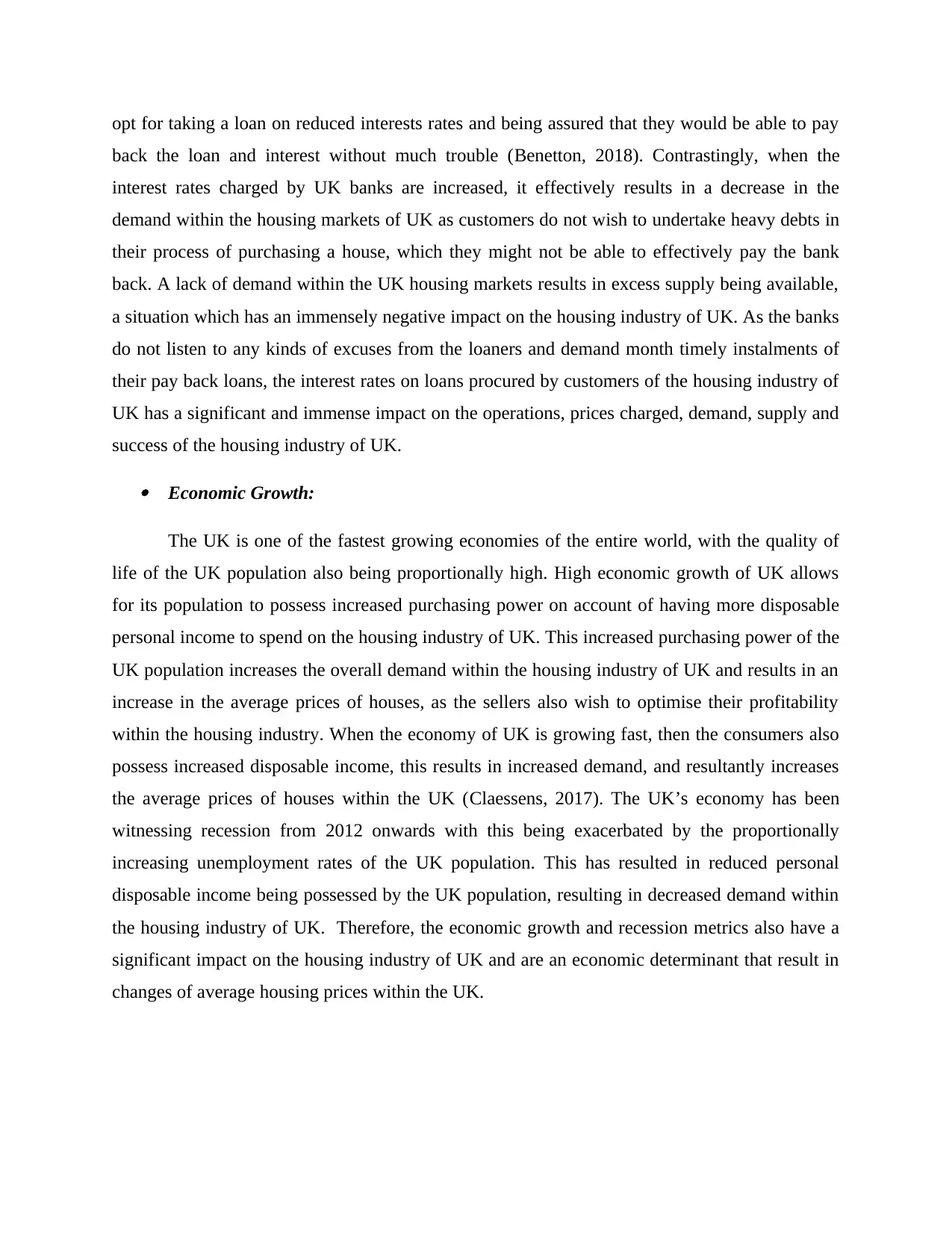
opt for taking a loan on reduced interests rates and being assured that they would be able to pay
back the loan and interest without much trouble (Benetton, 2018). Contrastingly, when the
interest rates charged by UK banks are increased, it effectively results in a decrease in the
demand within the housing markets of UK as customers do not wish to undertake heavy debts in
their process of purchasing a house, which they might not be able to effectively pay the bank
back. A lack of demand within the UK housing markets results in excess supply being available,
a situation which has an immensely negative impact on the housing industry of UK. As the banks
do not listen to any kinds of excuses from the loaners and demand month timely instalments of
their pay back loans, the interest rates on loans procured by customers of the housing industry of
UK has a significant and immense impact on the operations, prices charged, demand, supply and
success of the housing industry of UK.
Economic Growth:
The UK is one of the fastest growing economies of the entire world, with the quality of
life of the UK population also being proportionally high. High economic growth of UK allows
for its population to possess increased purchasing power on account of having more disposable
personal income to spend on the housing industry of UK. This increased purchasing power of the
UK population increases the overall demand within the housing industry of UK and results in an
increase in the average prices of houses, as the sellers also wish to optimise their profitability
within the housing industry. When the economy of UK is growing fast, then the consumers also
possess increased disposable income, this results in increased demand, and resultantly increases
the average prices of houses within the UK (Claessens, 2017). The UK’s economy has been
witnessing recession from 2012 onwards with this being exacerbated by the proportionally
increasing unemployment rates of the UK population. This has resulted in reduced personal
disposable income being possessed by the UK population, resulting in decreased demand within
the housing industry of UK. Therefore, the economic growth and recession metrics also have a
significant impact on the housing industry of UK and are an economic determinant that result in
changes of average housing prices within the UK.
back the loan and interest without much trouble (Benetton, 2018). Contrastingly, when the
interest rates charged by UK banks are increased, it effectively results in a decrease in the
demand within the housing markets of UK as customers do not wish to undertake heavy debts in
their process of purchasing a house, which they might not be able to effectively pay the bank
back. A lack of demand within the UK housing markets results in excess supply being available,
a situation which has an immensely negative impact on the housing industry of UK. As the banks
do not listen to any kinds of excuses from the loaners and demand month timely instalments of
their pay back loans, the interest rates on loans procured by customers of the housing industry of
UK has a significant and immense impact on the operations, prices charged, demand, supply and
success of the housing industry of UK.
Economic Growth:
The UK is one of the fastest growing economies of the entire world, with the quality of
life of the UK population also being proportionally high. High economic growth of UK allows
for its population to possess increased purchasing power on account of having more disposable
personal income to spend on the housing industry of UK. This increased purchasing power of the
UK population increases the overall demand within the housing industry of UK and results in an
increase in the average prices of houses, as the sellers also wish to optimise their profitability
within the housing industry. When the economy of UK is growing fast, then the consumers also
possess increased disposable income, this results in increased demand, and resultantly increases
the average prices of houses within the UK (Claessens, 2017). The UK’s economy has been
witnessing recession from 2012 onwards with this being exacerbated by the proportionally
increasing unemployment rates of the UK population. This has resulted in reduced personal
disposable income being possessed by the UK population, resulting in decreased demand within
the housing industry of UK. Therefore, the economic growth and recession metrics also have a
significant impact on the housing industry of UK and are an economic determinant that result in
changes of average housing prices within the UK.
⊘ This is a preview!⊘
Do you want full access?
Subscribe today to unlock all pages.

Trusted by 1+ million students worldwide
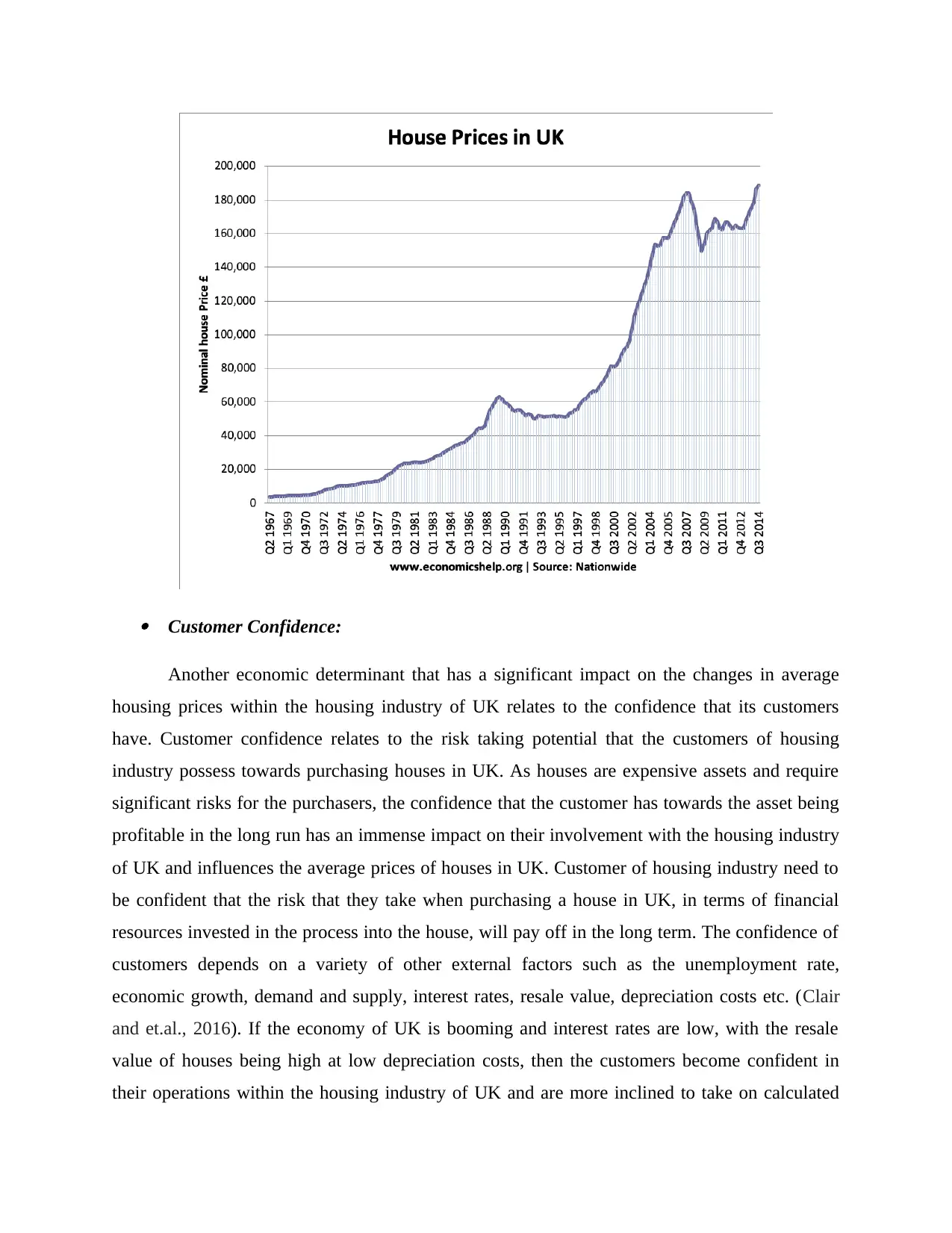
Customer Confidence:
Another economic determinant that has a significant impact on the changes in average
housing prices within the housing industry of UK relates to the confidence that its customers
have. Customer confidence relates to the risk taking potential that the customers of housing
industry possess towards purchasing houses in UK. As houses are expensive assets and require
significant risks for the purchasers, the confidence that the customer has towards the asset being
profitable in the long run has an immense impact on their involvement with the housing industry
of UK and influences the average prices of houses in UK. Customer of housing industry need to
be confident that the risk that they take when purchasing a house in UK, in terms of financial
resources invested in the process into the house, will pay off in the long term. The confidence of
customers depends on a variety of other external factors such as the unemployment rate,
economic growth, demand and supply, interest rates, resale value, depreciation costs etc. (Clair
and et.al., 2016). If the economy of UK is booming and interest rates are low, with the resale
value of houses being high at low depreciation costs, then the customers become confident in
their operations within the housing industry of UK and are more inclined to take on calculated
Another economic determinant that has a significant impact on the changes in average
housing prices within the housing industry of UK relates to the confidence that its customers
have. Customer confidence relates to the risk taking potential that the customers of housing
industry possess towards purchasing houses in UK. As houses are expensive assets and require
significant risks for the purchasers, the confidence that the customer has towards the asset being
profitable in the long run has an immense impact on their involvement with the housing industry
of UK and influences the average prices of houses in UK. Customer of housing industry need to
be confident that the risk that they take when purchasing a house in UK, in terms of financial
resources invested in the process into the house, will pay off in the long term. The confidence of
customers depends on a variety of other external factors such as the unemployment rate,
economic growth, demand and supply, interest rates, resale value, depreciation costs etc. (Clair
and et.al., 2016). If the economy of UK is booming and interest rates are low, with the resale
value of houses being high at low depreciation costs, then the customers become confident in
their operations within the housing industry of UK and are more inclined to take on calculated
Paraphrase This Document
Need a fresh take? Get an instant paraphrase of this document with our AI Paraphraser
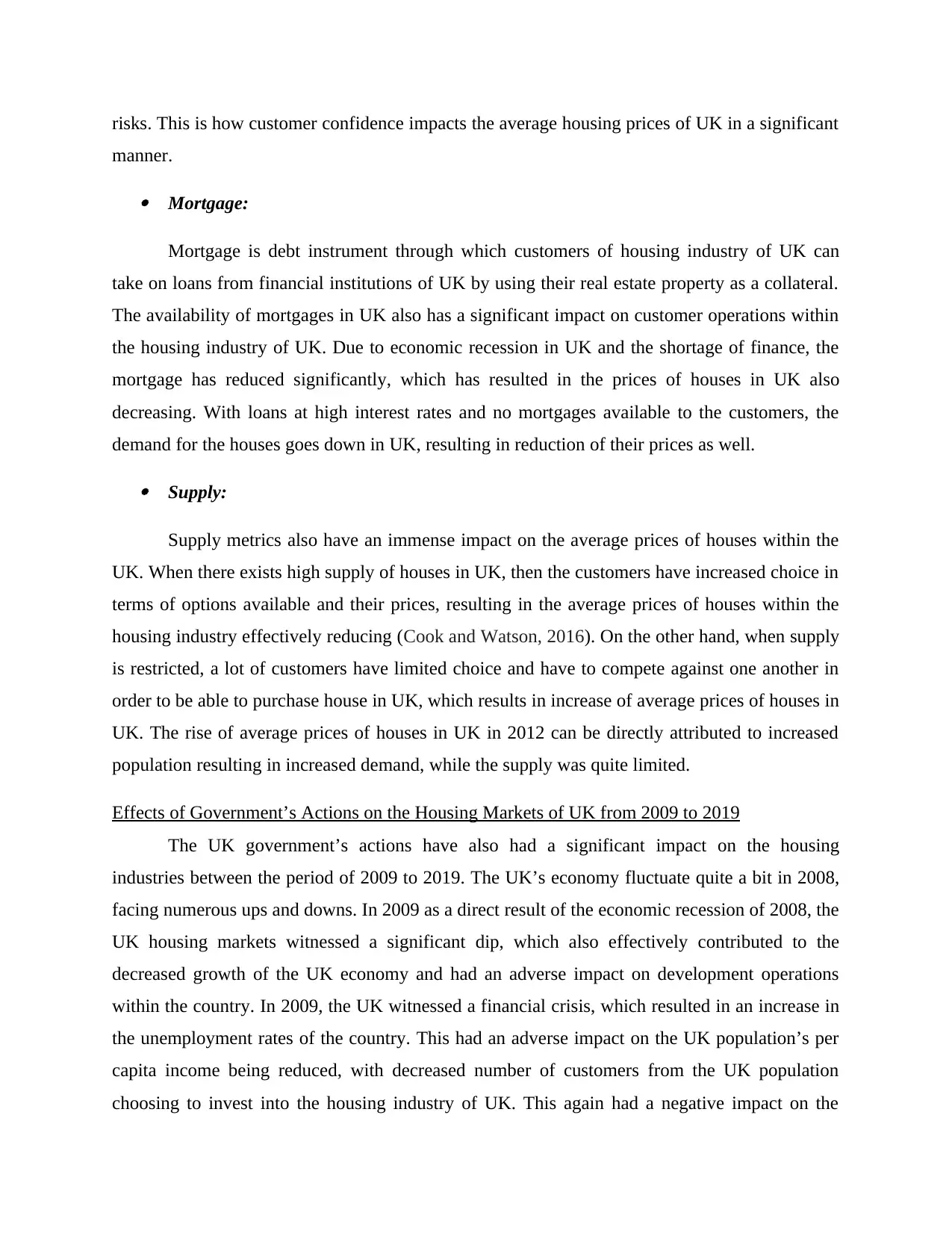
risks. This is how customer confidence impacts the average housing prices of UK in a significant
manner.
Mortgage:
Mortgage is debt instrument through which customers of housing industry of UK can
take on loans from financial institutions of UK by using their real estate property as a collateral.
The availability of mortgages in UK also has a significant impact on customer operations within
the housing industry of UK. Due to economic recession in UK and the shortage of finance, the
mortgage has reduced significantly, which has resulted in the prices of houses in UK also
decreasing. With loans at high interest rates and no mortgages available to the customers, the
demand for the houses goes down in UK, resulting in reduction of their prices as well.
Supply:
Supply metrics also have an immense impact on the average prices of houses within the
UK. When there exists high supply of houses in UK, then the customers have increased choice in
terms of options available and their prices, resulting in the average prices of houses within the
housing industry effectively reducing (Cook and Watson, 2016). On the other hand, when supply
is restricted, a lot of customers have limited choice and have to compete against one another in
order to be able to purchase house in UK, which results in increase of average prices of houses in
UK. The rise of average prices of houses in UK in 2012 can be directly attributed to increased
population resulting in increased demand, while the supply was quite limited.
Effects of Government’s Actions on the Housing Markets of UK from 2009 to 2019
The UK government’s actions have also had a significant impact on the housing
industries between the period of 2009 to 2019. The UK’s economy fluctuate quite a bit in 2008,
facing numerous ups and downs. In 2009 as a direct result of the economic recession of 2008, the
UK housing markets witnessed a significant dip, which also effectively contributed to the
decreased growth of the UK economy and had an adverse impact on development operations
within the country. In 2009, the UK witnessed a financial crisis, which resulted in an increase in
the unemployment rates of the country. This had an adverse impact on the UK population’s per
capita income being reduced, with decreased number of customers from the UK population
choosing to invest into the housing industry of UK. This again had a negative impact on the
manner.
Mortgage:
Mortgage is debt instrument through which customers of housing industry of UK can
take on loans from financial institutions of UK by using their real estate property as a collateral.
The availability of mortgages in UK also has a significant impact on customer operations within
the housing industry of UK. Due to economic recession in UK and the shortage of finance, the
mortgage has reduced significantly, which has resulted in the prices of houses in UK also
decreasing. With loans at high interest rates and no mortgages available to the customers, the
demand for the houses goes down in UK, resulting in reduction of their prices as well.
Supply:
Supply metrics also have an immense impact on the average prices of houses within the
UK. When there exists high supply of houses in UK, then the customers have increased choice in
terms of options available and their prices, resulting in the average prices of houses within the
housing industry effectively reducing (Cook and Watson, 2016). On the other hand, when supply
is restricted, a lot of customers have limited choice and have to compete against one another in
order to be able to purchase house in UK, which results in increase of average prices of houses in
UK. The rise of average prices of houses in UK in 2012 can be directly attributed to increased
population resulting in increased demand, while the supply was quite limited.
Effects of Government’s Actions on the Housing Markets of UK from 2009 to 2019
The UK government’s actions have also had a significant impact on the housing
industries between the period of 2009 to 2019. The UK’s economy fluctuate quite a bit in 2008,
facing numerous ups and downs. In 2009 as a direct result of the economic recession of 2008, the
UK housing markets witnessed a significant dip, which also effectively contributed to the
decreased growth of the UK economy and had an adverse impact on development operations
within the country. In 2009, the UK witnessed a financial crisis, which resulted in an increase in
the unemployment rates of the country. This had an adverse impact on the UK population’s per
capita income being reduced, with decreased number of customers from the UK population
choosing to invest into the housing industry of UK. This again had a negative impact on the
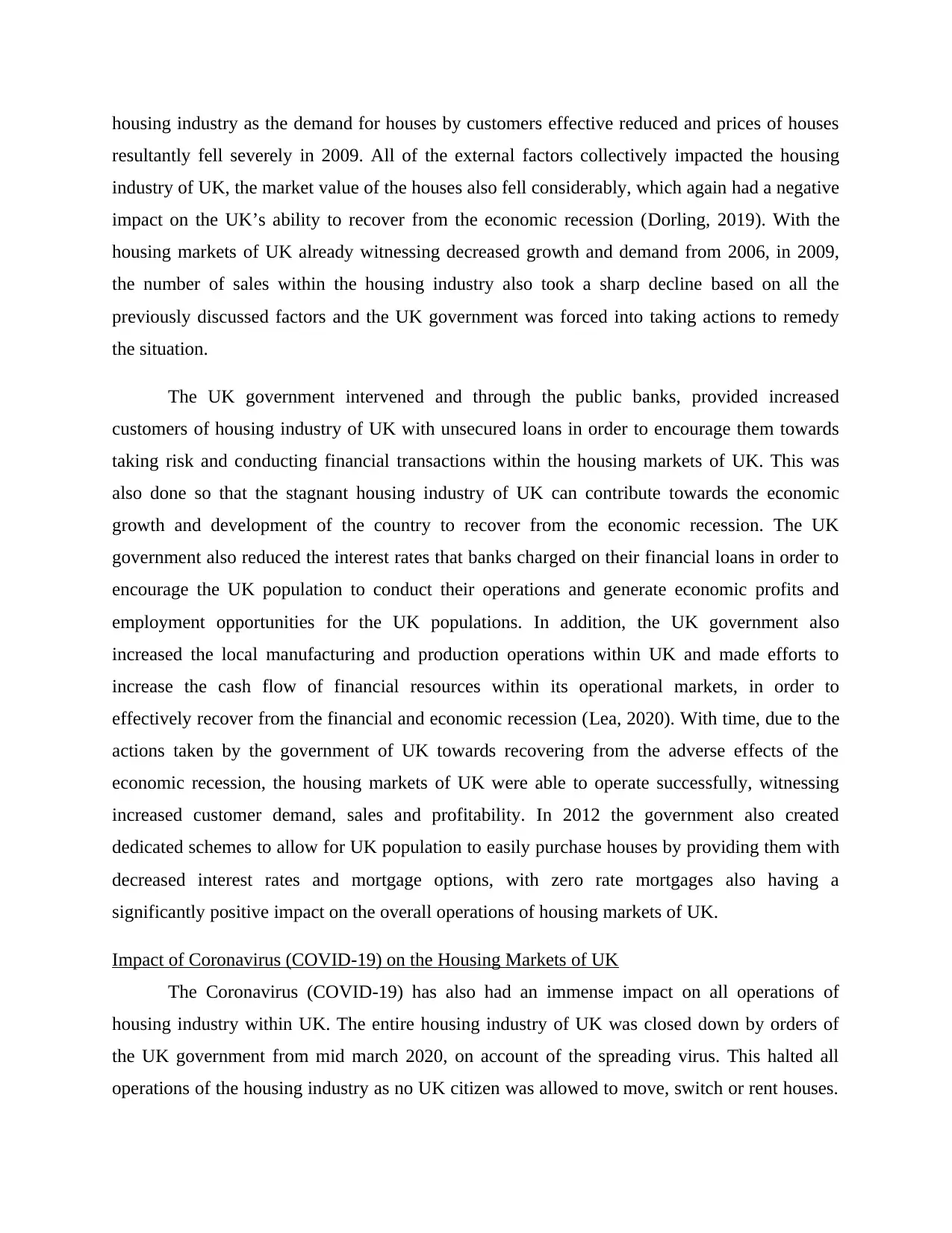
housing industry as the demand for houses by customers effective reduced and prices of houses
resultantly fell severely in 2009. All of the external factors collectively impacted the housing
industry of UK, the market value of the houses also fell considerably, which again had a negative
impact on the UK’s ability to recover from the economic recession (Dorling, 2019). With the
housing markets of UK already witnessing decreased growth and demand from 2006, in 2009,
the number of sales within the housing industry also took a sharp decline based on all the
previously discussed factors and the UK government was forced into taking actions to remedy
the situation.
The UK government intervened and through the public banks, provided increased
customers of housing industry of UK with unsecured loans in order to encourage them towards
taking risk and conducting financial transactions within the housing markets of UK. This was
also done so that the stagnant housing industry of UK can contribute towards the economic
growth and development of the country to recover from the economic recession. The UK
government also reduced the interest rates that banks charged on their financial loans in order to
encourage the UK population to conduct their operations and generate economic profits and
employment opportunities for the UK populations. In addition, the UK government also
increased the local manufacturing and production operations within UK and made efforts to
increase the cash flow of financial resources within its operational markets, in order to
effectively recover from the financial and economic recession (Lea, 2020). With time, due to the
actions taken by the government of UK towards recovering from the adverse effects of the
economic recession, the housing markets of UK were able to operate successfully, witnessing
increased customer demand, sales and profitability. In 2012 the government also created
dedicated schemes to allow for UK population to easily purchase houses by providing them with
decreased interest rates and mortgage options, with zero rate mortgages also having a
significantly positive impact on the overall operations of housing markets of UK.
Impact of Coronavirus (COVID-19) on the Housing Markets of UK
The Coronavirus (COVID-19) has also had an immense impact on all operations of
housing industry within UK. The entire housing industry of UK was closed down by orders of
the UK government from mid march 2020, on account of the spreading virus. This halted all
operations of the housing industry as no UK citizen was allowed to move, switch or rent houses.
resultantly fell severely in 2009. All of the external factors collectively impacted the housing
industry of UK, the market value of the houses also fell considerably, which again had a negative
impact on the UK’s ability to recover from the economic recession (Dorling, 2019). With the
housing markets of UK already witnessing decreased growth and demand from 2006, in 2009,
the number of sales within the housing industry also took a sharp decline based on all the
previously discussed factors and the UK government was forced into taking actions to remedy
the situation.
The UK government intervened and through the public banks, provided increased
customers of housing industry of UK with unsecured loans in order to encourage them towards
taking risk and conducting financial transactions within the housing markets of UK. This was
also done so that the stagnant housing industry of UK can contribute towards the economic
growth and development of the country to recover from the economic recession. The UK
government also reduced the interest rates that banks charged on their financial loans in order to
encourage the UK population to conduct their operations and generate economic profits and
employment opportunities for the UK populations. In addition, the UK government also
increased the local manufacturing and production operations within UK and made efforts to
increase the cash flow of financial resources within its operational markets, in order to
effectively recover from the financial and economic recession (Lea, 2020). With time, due to the
actions taken by the government of UK towards recovering from the adverse effects of the
economic recession, the housing markets of UK were able to operate successfully, witnessing
increased customer demand, sales and profitability. In 2012 the government also created
dedicated schemes to allow for UK population to easily purchase houses by providing them with
decreased interest rates and mortgage options, with zero rate mortgages also having a
significantly positive impact on the overall operations of housing markets of UK.
Impact of Coronavirus (COVID-19) on the Housing Markets of UK
The Coronavirus (COVID-19) has also had an immense impact on all operations of
housing industry within UK. The entire housing industry of UK was closed down by orders of
the UK government from mid march 2020, on account of the spreading virus. This halted all
operations of the housing industry as no UK citizen was allowed to move, switch or rent houses.
⊘ This is a preview!⊘
Do you want full access?
Subscribe today to unlock all pages.

Trusted by 1+ million students worldwide
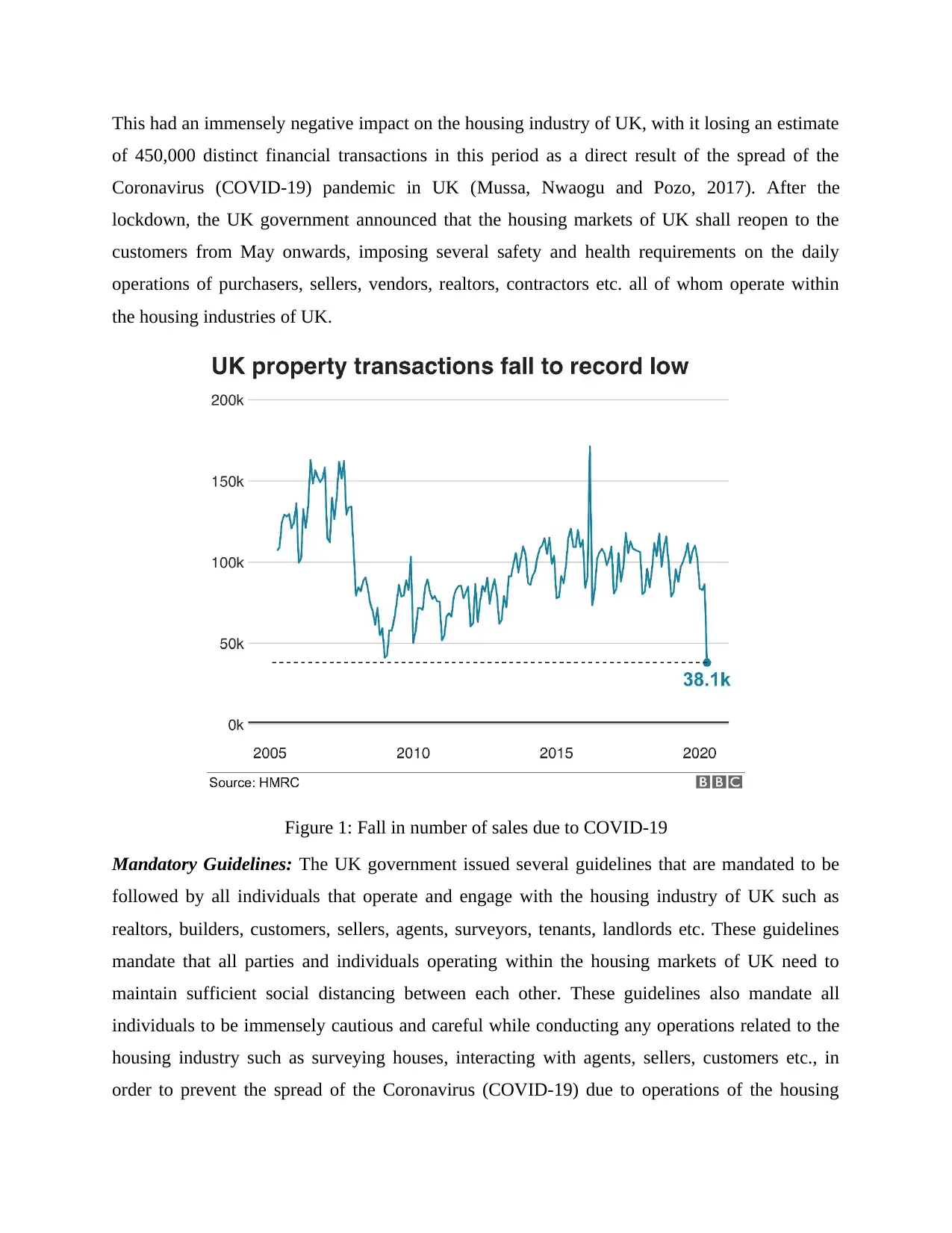
This had an immensely negative impact on the housing industry of UK, with it losing an estimate
of 450,000 distinct financial transactions in this period as a direct result of the spread of the
Coronavirus (COVID-19) pandemic in UK (Mussa, Nwaogu and Pozo, 2017). After the
lockdown, the UK government announced that the housing markets of UK shall reopen to the
customers from May onwards, imposing several safety and health requirements on the daily
operations of purchasers, sellers, vendors, realtors, contractors etc. all of whom operate within
the housing industries of UK.
Figure 1: Fall in number of sales due to COVID-19
Mandatory Guidelines: The UK government issued several guidelines that are mandated to be
followed by all individuals that operate and engage with the housing industry of UK such as
realtors, builders, customers, sellers, agents, surveyors, tenants, landlords etc. These guidelines
mandate that all parties and individuals operating within the housing markets of UK need to
maintain sufficient social distancing between each other. These guidelines also mandate all
individuals to be immensely cautious and careful while conducting any operations related to the
housing industry such as surveying houses, interacting with agents, sellers, customers etc., in
order to prevent the spread of the Coronavirus (COVID-19) due to operations of the housing
of 450,000 distinct financial transactions in this period as a direct result of the spread of the
Coronavirus (COVID-19) pandemic in UK (Mussa, Nwaogu and Pozo, 2017). After the
lockdown, the UK government announced that the housing markets of UK shall reopen to the
customers from May onwards, imposing several safety and health requirements on the daily
operations of purchasers, sellers, vendors, realtors, contractors etc. all of whom operate within
the housing industries of UK.
Figure 1: Fall in number of sales due to COVID-19
Mandatory Guidelines: The UK government issued several guidelines that are mandated to be
followed by all individuals that operate and engage with the housing industry of UK such as
realtors, builders, customers, sellers, agents, surveyors, tenants, landlords etc. These guidelines
mandate that all parties and individuals operating within the housing markets of UK need to
maintain sufficient social distancing between each other. These guidelines also mandate all
individuals to be immensely cautious and careful while conducting any operations related to the
housing industry such as surveying houses, interacting with agents, sellers, customers etc., in
order to prevent the spread of the Coronavirus (COVID-19) due to operations of the housing
Paraphrase This Document
Need a fresh take? Get an instant paraphrase of this document with our AI Paraphraser
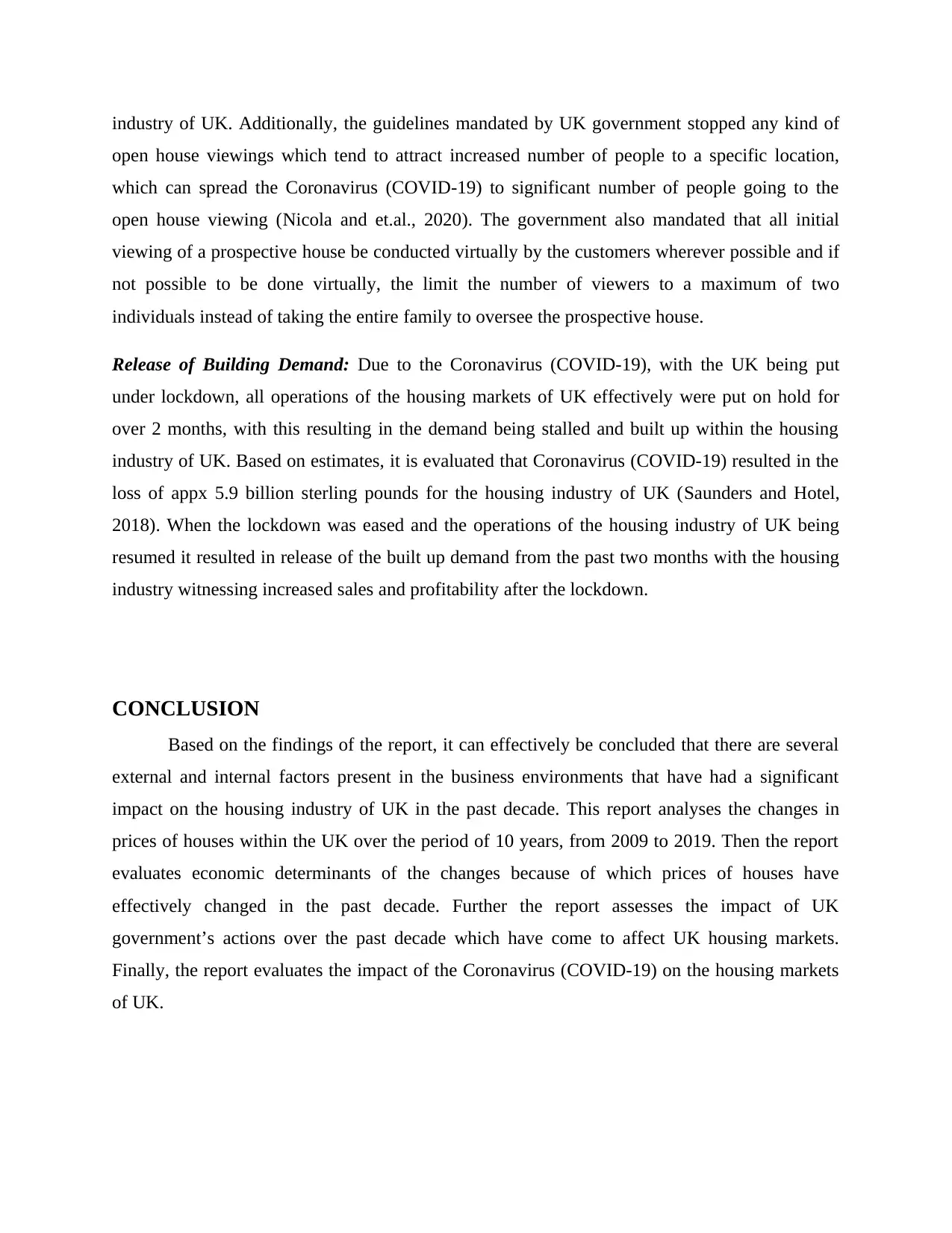
industry of UK. Additionally, the guidelines mandated by UK government stopped any kind of
open house viewings which tend to attract increased number of people to a specific location,
which can spread the Coronavirus (COVID-19) to significant number of people going to the
open house viewing (Nicola and et.al., 2020). The government also mandated that all initial
viewing of a prospective house be conducted virtually by the customers wherever possible and if
not possible to be done virtually, the limit the number of viewers to a maximum of two
individuals instead of taking the entire family to oversee the prospective house.
Release of Building Demand: Due to the Coronavirus (COVID-19), with the UK being put
under lockdown, all operations of the housing markets of UK effectively were put on hold for
over 2 months, with this resulting in the demand being stalled and built up within the housing
industry of UK. Based on estimates, it is evaluated that Coronavirus (COVID-19) resulted in the
loss of appx 5.9 billion sterling pounds for the housing industry of UK (Saunders and Hotel,
2018). When the lockdown was eased and the operations of the housing industry of UK being
resumed it resulted in release of the built up demand from the past two months with the housing
industry witnessing increased sales and profitability after the lockdown.
CONCLUSION
Based on the findings of the report, it can effectively be concluded that there are several
external and internal factors present in the business environments that have had a significant
impact on the housing industry of UK in the past decade. This report analyses the changes in
prices of houses within the UK over the period of 10 years, from 2009 to 2019. Then the report
evaluates economic determinants of the changes because of which prices of houses have
effectively changed in the past decade. Further the report assesses the impact of UK
government’s actions over the past decade which have come to affect UK housing markets.
Finally, the report evaluates the impact of the Coronavirus (COVID-19) on the housing markets
of UK.
open house viewings which tend to attract increased number of people to a specific location,
which can spread the Coronavirus (COVID-19) to significant number of people going to the
open house viewing (Nicola and et.al., 2020). The government also mandated that all initial
viewing of a prospective house be conducted virtually by the customers wherever possible and if
not possible to be done virtually, the limit the number of viewers to a maximum of two
individuals instead of taking the entire family to oversee the prospective house.
Release of Building Demand: Due to the Coronavirus (COVID-19), with the UK being put
under lockdown, all operations of the housing markets of UK effectively were put on hold for
over 2 months, with this resulting in the demand being stalled and built up within the housing
industry of UK. Based on estimates, it is evaluated that Coronavirus (COVID-19) resulted in the
loss of appx 5.9 billion sterling pounds for the housing industry of UK (Saunders and Hotel,
2018). When the lockdown was eased and the operations of the housing industry of UK being
resumed it resulted in release of the built up demand from the past two months with the housing
industry witnessing increased sales and profitability after the lockdown.
CONCLUSION
Based on the findings of the report, it can effectively be concluded that there are several
external and internal factors present in the business environments that have had a significant
impact on the housing industry of UK in the past decade. This report analyses the changes in
prices of houses within the UK over the period of 10 years, from 2009 to 2019. Then the report
evaluates economic determinants of the changes because of which prices of houses have
effectively changed in the past decade. Further the report assesses the impact of UK
government’s actions over the past decade which have come to affect UK housing markets.
Finally, the report evaluates the impact of the Coronavirus (COVID-19) on the housing markets
of UK.
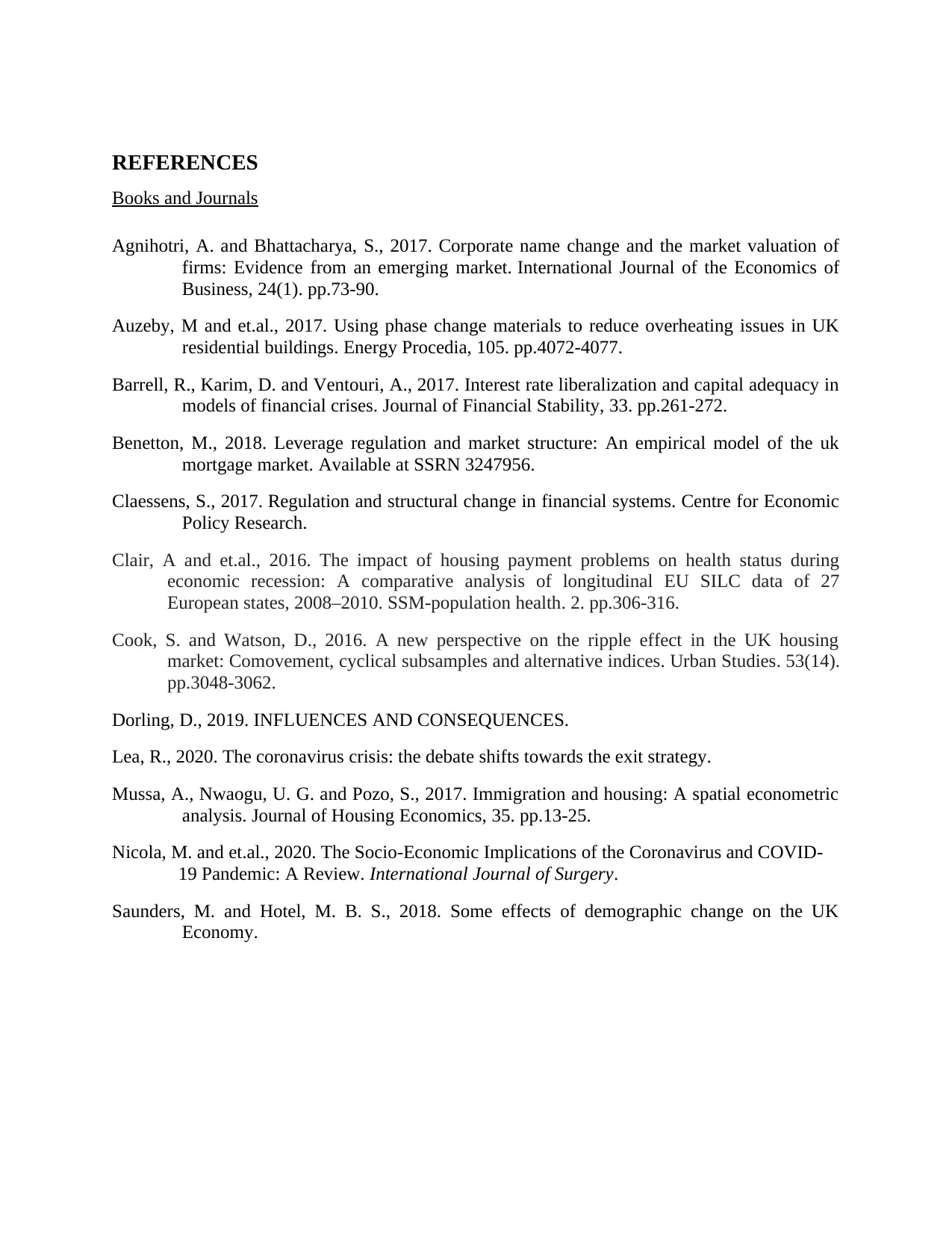
REFERENCES
Books and Journals
Agnihotri, A. and Bhattacharya, S., 2017. Corporate name change and the market valuation of
firms: Evidence from an emerging market. International Journal of the Economics of
Business, 24(1). pp.73-90.
Auzeby, M and et.al., 2017. Using phase change materials to reduce overheating issues in UK
residential buildings. Energy Procedia, 105. pp.4072-4077.
Barrell, R., Karim, D. and Ventouri, A., 2017. Interest rate liberalization and capital adequacy in
models of financial crises. Journal of Financial Stability, 33. pp.261-272.
Benetton, M., 2018. Leverage regulation and market structure: An empirical model of the uk
mortgage market. Available at SSRN 3247956.
Claessens, S., 2017. Regulation and structural change in financial systems. Centre for Economic
Policy Research.
Clair, A and et.al., 2016. The impact of housing payment problems on health status during
economic recession: A comparative analysis of longitudinal EU SILC data of 27
European states, 2008–2010. SSM-population health. 2. pp.306-316.
Cook, S. and Watson, D., 2016. A new perspective on the ripple effect in the UK housing
market: Comovement, cyclical subsamples and alternative indices. Urban Studies. 53(14).
pp.3048-3062.
Dorling, D., 2019. INFLUENCES AND CONSEQUENCES.
Lea, R., 2020. The coronavirus crisis: the debate shifts towards the exit strategy.
Mussa, A., Nwaogu, U. G. and Pozo, S., 2017. Immigration and housing: A spatial econometric
analysis. Journal of Housing Economics, 35. pp.13-25.
Nicola, M. and et.al., 2020. The Socio-Economic Implications of the Coronavirus and COVID-
19 Pandemic: A Review. International Journal of Surgery.
Saunders, M. and Hotel, M. B. S., 2018. Some effects of demographic change on the UK
Economy.
Books and Journals
Agnihotri, A. and Bhattacharya, S., 2017. Corporate name change and the market valuation of
firms: Evidence from an emerging market. International Journal of the Economics of
Business, 24(1). pp.73-90.
Auzeby, M and et.al., 2017. Using phase change materials to reduce overheating issues in UK
residential buildings. Energy Procedia, 105. pp.4072-4077.
Barrell, R., Karim, D. and Ventouri, A., 2017. Interest rate liberalization and capital adequacy in
models of financial crises. Journal of Financial Stability, 33. pp.261-272.
Benetton, M., 2018. Leverage regulation and market structure: An empirical model of the uk
mortgage market. Available at SSRN 3247956.
Claessens, S., 2017. Regulation and structural change in financial systems. Centre for Economic
Policy Research.
Clair, A and et.al., 2016. The impact of housing payment problems on health status during
economic recession: A comparative analysis of longitudinal EU SILC data of 27
European states, 2008–2010. SSM-population health. 2. pp.306-316.
Cook, S. and Watson, D., 2016. A new perspective on the ripple effect in the UK housing
market: Comovement, cyclical subsamples and alternative indices. Urban Studies. 53(14).
pp.3048-3062.
Dorling, D., 2019. INFLUENCES AND CONSEQUENCES.
Lea, R., 2020. The coronavirus crisis: the debate shifts towards the exit strategy.
Mussa, A., Nwaogu, U. G. and Pozo, S., 2017. Immigration and housing: A spatial econometric
analysis. Journal of Housing Economics, 35. pp.13-25.
Nicola, M. and et.al., 2020. The Socio-Economic Implications of the Coronavirus and COVID-
19 Pandemic: A Review. International Journal of Surgery.
Saunders, M. and Hotel, M. B. S., 2018. Some effects of demographic change on the UK
Economy.
⊘ This is a preview!⊘
Do you want full access?
Subscribe today to unlock all pages.

Trusted by 1+ million students worldwide
1 out of 12
Related Documents
Your All-in-One AI-Powered Toolkit for Academic Success.
+13062052269
info@desklib.com
Available 24*7 on WhatsApp / Email
![[object Object]](/_next/static/media/star-bottom.7253800d.svg)
Unlock your academic potential
© 2024 | Zucol Services PVT LTD | All rights reserved.





